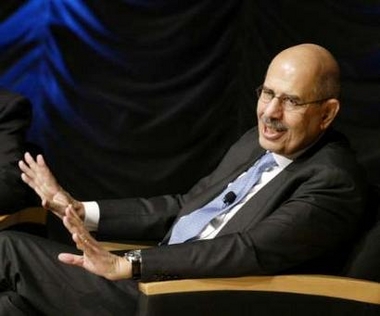|
UN nuclear chief sees progress on Iran
(AP)
Updated: 2005-11-08 10:01
As Europeans mull an Iranian offer to resume negotiations, the head of the
U.N. nuclear watchdog agency said Monday that his inspectors were making
progress in their effort to probe the country's nuclear weapons intentions.
"We are moving in the right direction," Mohamed ElBaradei, winner of this
year's Nobel Peace Prize, said at a conference sponsored by the Carnegie
Endowment for International Peace.
However, he said his inspectors were eager to take a look at the Lavizan
facility, where Iran conducts high-explosive tests that could have a bearing on
developing weapons.
Overall, he said, "we are making good progress with Iran."
Iran has offered to reopen negotiations with Britain, France and Germany.
There has been no formal response, but British Prime Minister Tony Blair said in
London that "Iran's got to face up to its responsibilities, it's got to abide by
the strictures and obligations of the atomic energy authority."
At the State Department, spokesman Adam Ereli said Iran should agree to stop
its enrichment program before any new talks with the Europeans.
The board of the International Atomic Energy Agency, of which ElBaradei is
director general, has held back from referring its criticism of Iran to the U.N.
Security Council, where economic and political penalties would be considered.

International Atomic Energy Agency (IAEA)
Director General Mohammed ElBaradei answers a question during an
International Non-Proliferation conference in Washington November 7,
2005.[Reuters] | ElBaradei offered no
recommendation in his remarks at the conference, attended by officials,
scientists and academicians from 17 countries.
Iran's determination to pursue enrichment of weapons material is the primary
concern of the Europeans, the United States and the U.N. agency.
ElBaradei said he was hopeful that, within a year, a nuclear fuel reserve
could be established to provide countries like Iran with technology for civilian
nuclear reactors while they would agree to a moratorium in enriching nuclear
fuel. "We are very close," he said.
He said Iran and North Korea, whose nuclear program also is of concern, need
to be made to feel secure, with economic and other concessions, in the event
they give up nuclear weapons.
In a report released Monday, the General Accounting Office praised the IAEA
as a cornerstone of U.S. efforts to stop the spread of nuclear weapons, and for
increasing its efforts to combat nuclear terrorism and helping countries to
safeguard nuclear and radioactive material.
The GAO, the investigative arm of Congress, also suggested that the agency is
stretched thin and should consider eliminating or reducing its oversight in
countries with small quantities of nuclear material.
And, the GAO said, despite success in uncovering some countries' secret
nuclear activities, "a determined country can still conceal a nuclear weapons
program."
Negotiations on North Korea's program are due to resume on Wednesday in
Beijing, with the United States, China, South Korea, Japan and Russia all
pressing for a plan to implement North Korea's pledge to end its program.
Last month, Energy Secretary Samuel Bodman told the IAEA in a videotaped
message that the United States would establish a nuclear fuel reserve for
countries that forgo the ability to make their own nuclear fuel.
And Russia has offered to make nuclear material available to Iran through the
IAEA.
ElBaradei said Monday that "once you have that assured supply, you have taken
away the justification for countries to say, 'I'd like to make my own fuel,' and
that's 80 percent of the problem."
ElBaradei was praised by several delegates to the two-day conference for his
findings in early 2003, before President bush went to war with Iraq, that there
was no evidence Saddam Hussein had hidden arsenals of weapons of mass
destruction, a claim that was pivotal to Bush's war policy.
The administration opposed a third term for ElBaradei as head of the U.N.
agency, but it had to relent when other countries could not be swayed to line up
with the United States against the Egyptian diplomat.
|